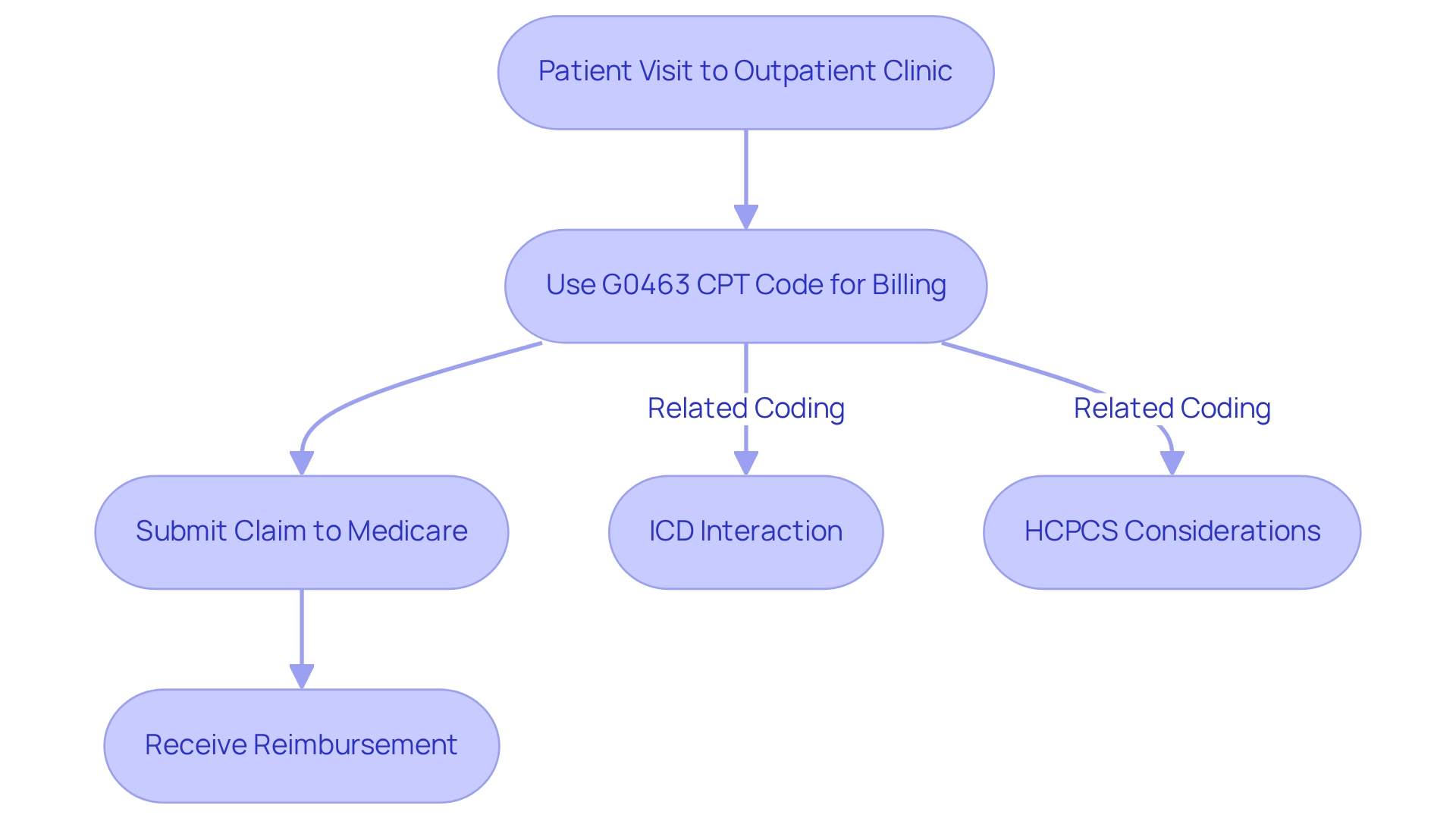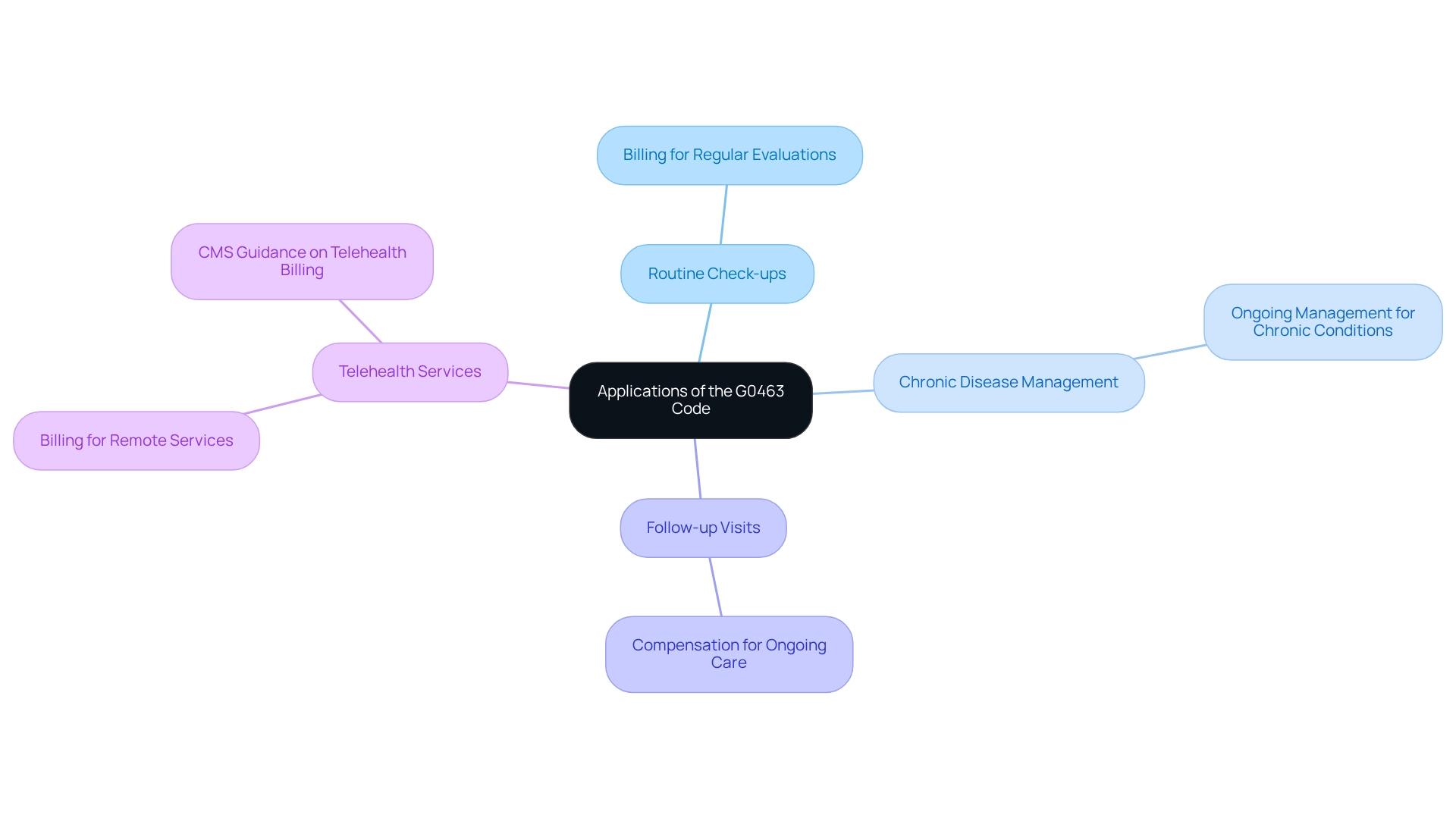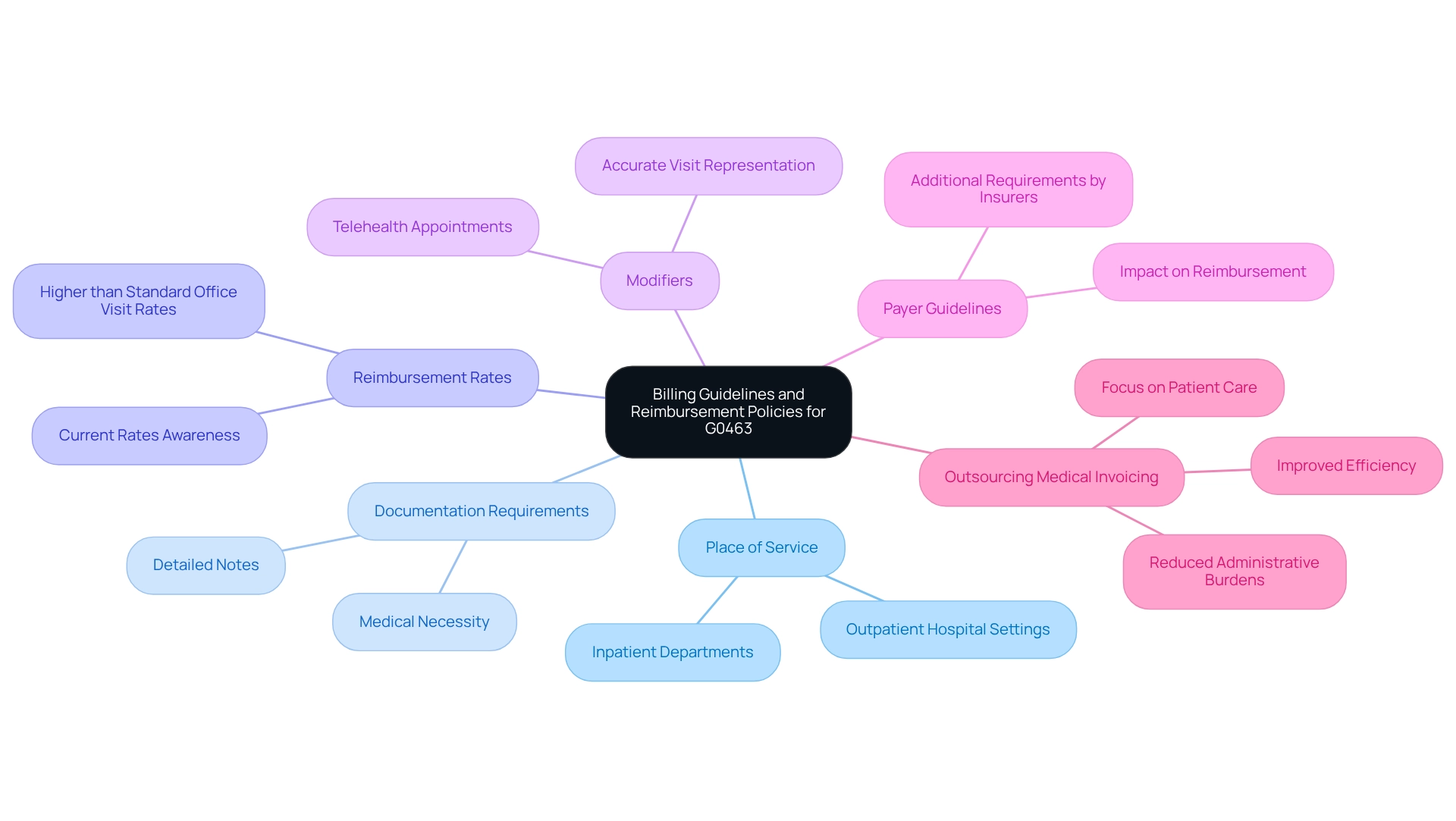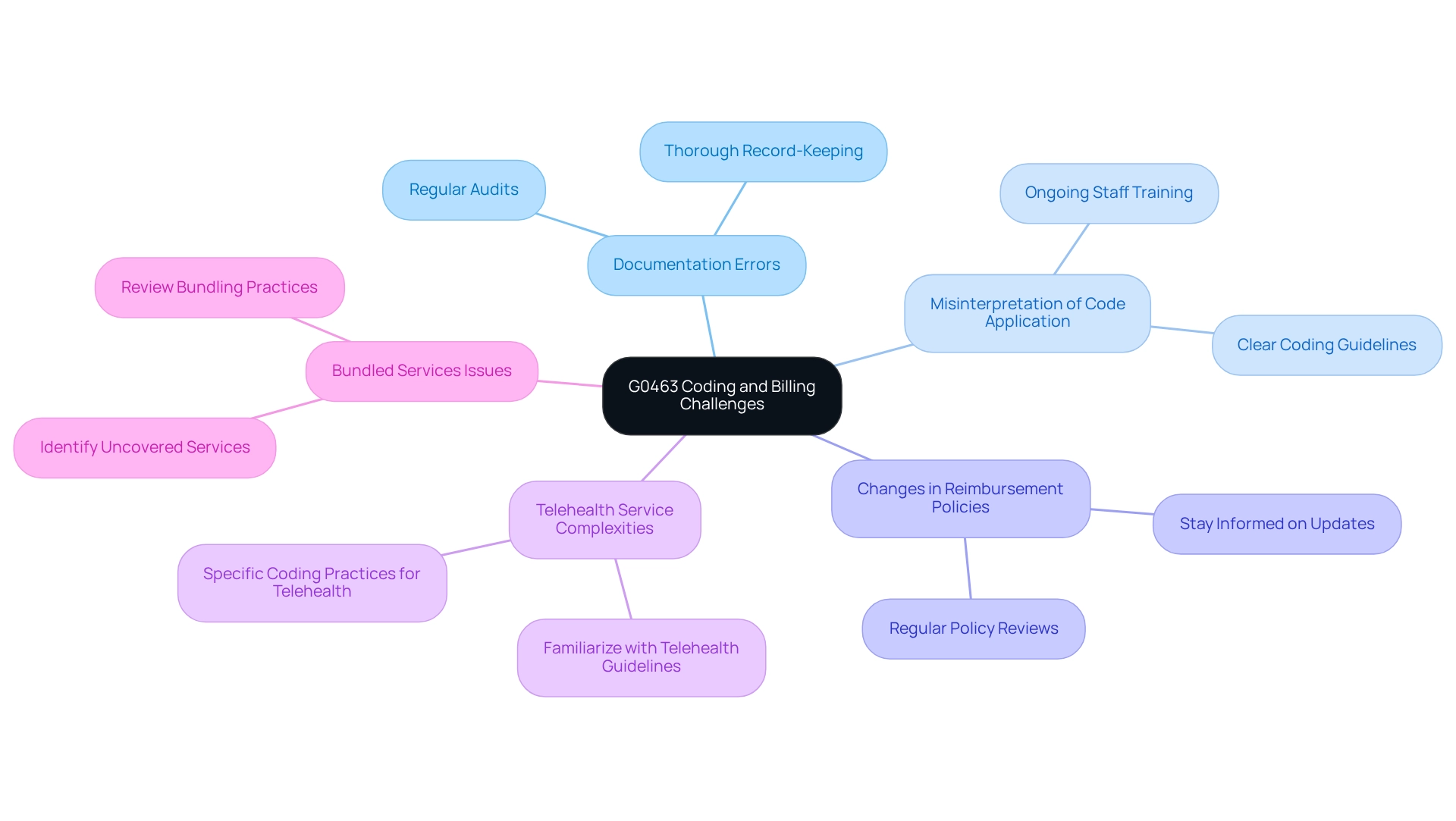Overview
The G0463 CPT code plays a pivotal role in the billing of hospital outpatient clinic visits, enabling healthcare providers to secure appropriate reimbursement for evaluating and managing patients in these environments. Its significance is underscored through a comprehensive examination of usage guidelines, financial implications for outpatient services, and the complexities of coding. These elements highlight the critical need for precise documentation and strict adherence to Medicare regulations, ultimately optimizing revenue cycle management. Understanding these factors is essential for healthcare professionals aiming to enhance their operational efficiency and financial outcomes.
Introduction
In the intricate realm of medical billing, the G0463 CPT code emerges as a crucial element for healthcare providers navigating outpatient clinic visits. This code not only ensures appropriate reimbursement for essential services rendered but also plays a vital role in maintaining compliance with Medicare regulations. With outpatient visits on the rise, grasping the nuances of the G0463 code is increasingly imperative for healthcare facilities striving to optimize their billing practices and uphold financial viability. By delving into its applications, billing guidelines, and the challenges it presents, healthcare providers can enhance their revenue cycle management and, ultimately, improve patient care.
Define the G0463 CPT Code and Its Importance in Medical Billing
The g0463 cpt code is specifically intended for hospital outpatient clinic visits, focusing on the evaluation and management of patients. This system is crucial as it enables healthcare facilities to bill for services rendered in outpatient settings, ensuring appropriate reimbursement for the care provided. Its importance lies in the ability to differentiate outpatient clinic visits from other types of encounters, thereby facilitating precise payment processing and adherence to Medicare regulations. Mastery of this system is essential for healthcare providers to effectively navigate the complexities of medical billing and the broader Medicare treatment pathways.
When an individual visits a hospital outpatient clinic for evaluation and management, the facility can use the g0463 cpt code to bill Medicare, which helps cover the associated costs of the visit. This billing process is vital for maintaining the financial viability of hospitals while delivering necessary patient care. Recent statistics indicate that outpatient clinic visits are on the rise, underscoring the significance of precise charging practices. The AAPC Thought Leadership Team’s recent assessment of outpatient facility coding guidelines on January 27, 2025, reaffirms the importance of this identifier in current payment practices, emphasizing how updated guidelines affect its use.
Understanding how this classification interacts with other coding systems, such as ICD and HCPCS, is crucial for examining patient treatment pathways. Specific facilities, like critical access hospitals, may utilize C codes at their discretion, which can influence the payment practices related to the identifier. Grasping these nuances is essential for ensuring compliance and optimizing revenue cycle management. Experts in healthcare billing emphasize that comprehending the g0463 cpt code is not merely about compliance; it is also about enhancing claim acceptance rates. As healthcare billing experts note, “To ensure compliance, improve your claim acceptance rates, and optimize your medical billing processes, consider outsourcing to a team of professionals.”
Case studies, such as the evaluation and re-assessment of wounds, illustrate the importance of documenting significant changes in individual conditions to justify additional evaluations and ensure proper reimbursement. In the context of the designation, thorough documentation is crucial for facilitating comprehensive healthcare and securing appropriate financial support for outpatient services. This ultimately contributes to a more effective navigation of Medicare treatment pathways.

Explore Applications of the G0463 Code in Clinical Settings
The designation plays a crucial role in hospital outpatient clinics, serving multiple functions that enhance patient care and streamline payment practices within the Medicare framework. Key applications of the G0463 code include:
- Routine Check-ups: This guideline is applicable for billing outpatient visits during regular evaluations, ensuring that healthcare providers receive appropriate compensation for these essential services.
- Chronic Disease Management: For individuals with chronic conditions, ongoing management is vital. Visits intended for overseeing these conditions can be billed using the appropriate designation, promoting better care continuity and reimbursement as individuals navigate their treatment pathways.
- Follow-up Visits: Following initial evaluations or treatments, follow-up appointments can also utilize the relevant designation, ensuring that providers are compensated for the necessary ongoing care, which is critical for effective client journeys through lines-of-therapy.
- Telehealth Services: The rise of telehealth has transformed patient interactions. The g0463 cpt code can be billed for outpatient visits conducted via telecommunication, as long as the services comply with established criteria. This adaptation is particularly pertinent considering recent updates from CMS, which clarified payment practices for remote services during the COVID-19 Public Health Emergency. A case study titled “Clarifying Codes Q3014: Hospital Billing for Services Furnished Using Telecommunications Technology” highlights the challenges faced by healthcare facilities in billing for these remote services, underscoring the importance of accurate coding in the context of Medicare claims data.
Understanding these applications is essential for healthcare providers aiming to bill correctly and optimize reimbursement potential. Reimbursement rates for the specific designation are defined based on Relative Value Units (RVUs) under the Medicare Physician Fee Schedule, emphasizing the financial implications of its use. As the landscape of healthcare delivery evolves, remaining knowledgeable about the uses of this classification will enable providers to manage payment complexities efficiently. As noted by PCC Verdict, “CPT designation is categorized as an Evaluation and Management (E/M) classification,” further clarifying its role in the invoicing process. Additionally, it embodies the evolving landscape of healthcare delivery and billing practices, making it imperative for providers to stay updated on its applications.

Detail Billing Guidelines and Reimbursement Policies for G0463
Billing for the specified procedure necessitates strict adherence to the guidelines established by Medicare and other insurers. Key considerations include:
- Place of Service: The specific designation holds relevance exclusively in outpatient hospital settings; charges cannot be applied for services rendered in inpatient departments.
- Documentation Requirements: Comprehensive documentation is vital to substantiate the medical necessity of the visit. This should encompass detailed notes regarding the individual’s condition and the services provided.
- Reimbursement Rates: Typically, reimbursement for the specified service exceeds that of standard office visit rates, reflecting the elevated overhead costs associated with facility-based care. Providers must remain informed about current rates and any potential adjustments.
- Modifiers: Certain scenarios, such as telehealth appointments, may require the application of modifiers to accurately convey the nature of the visit.
- Payer Guidelines: Healthcare providers must be cognizant of payer guidelines, as various insurance carriers may impose additional requirements that could influence reimbursement.
By adhering to these guidelines, healthcare providers can bolster compliance and reduce the risk of claim denials, ultimately enhancing their revenue cycle management. Moreover, outsourcing medical invoicing can further streamline these processes, allowing providers to concentrate on patient care while specialists manage invoicing complexities, resulting in improved efficiency and revenue. As noted by Medical Bill Gurus, healthcare providers must comprehend the guidelines and requirements related to the g0463 cpt code to guarantee precise and prompt reimbursement for their services. Furthermore, the advantages of outsourcing medical invoicing, as highlighted in the case study titled ‘Benefits of Outsourcing Medical Invoicing,’ illustrate how specialized invoicing services can enhance efficiency and alleviate administrative burdens.

Identify Challenges and Best Practices in G0463 Coding and Billing
Billing for the g0463 cpt code presents several challenges that healthcare providers must navigate effectively. Documentation errors, particularly incomplete or inaccurate records, are a leading cause of claim denials. To combat this, implementing thorough record-keeping practices and conducting regular audits is essential for ensuring compliance and accuracy. Additionally, misinterpretation of code application can lead to payment issues when providers incorrectly use this classification in unsuitable contexts. Regular training sessions on proper coding practices are crucial to minimize these errors.
Moreover, changes in reimbursement policies by Medicare and other insurers frequently create confusion. Staying informed about these updates is vital for maintaining compliance and ensuring claims are processed correctly. The rise of telehealth services has also introduced complexities in the application of the g0463 cpt code. Providers should familiarize themselves with specific telehealth payment guidelines to ensure accurate coding in these scenarios. Furthermore, improperly bundled services and uncovered services are frequent causes for denials, complicating the invoicing process.
To alleviate these challenges, healthcare organizations should adopt best practices such as ongoing staff training, keeping up-to-date with payment guidelines, and utilizing advanced coding software. These strategies not only improve statement accuracy but also cultivate greater trust among patients. Notably, only one-third of patients are confident in the precision of their medical statements, emphasizing the necessity for providers to prioritize transparency and accuracy in invoicing practices. As Alison Adams, a career expert, observes, ‘50% of insurance denials are due to erroneous charges.’ By addressing these issues, providers can enhance client confidence and decrease the likelihood of denials. Furthermore, the case study titled ‘Patient Confidence in Medical Bills’ underscores the importance of transparency in healthcare billing, reinforcing the need for patients to actively seek second opinions to verify billing accuracy.

Conclusion
The G0463 CPT code stands as a cornerstone of efficient medical billing in outpatient settings, playing a pivotal role in ensuring that healthcare providers receive appropriate reimbursement for their services. Grasping the nuances of this code—particularly its applications for routine check-ups, chronic disease management, and telehealth services—empowers healthcare facilities to optimize their billing practices and enhance patient care. Proper utilization of the G0463 code not only aids in compliance with Medicare regulations but also fosters financial viability for hospitals as outpatient visits continue to rise.
Adhering to established billing guidelines is essential for maximizing reimbursement potential. Key considerations, such as documentation requirements, place of service, and awareness of payer-specific guidelines, are crucial for mitigating claim denials and streamlining revenue cycle management. Furthermore, embracing best practices—such as ongoing staff training and utilizing advanced coding software—can significantly reduce challenges associated with G0463 coding, including documentation errors and misunderstandings of code usage.
Ultimately, mastering the G0463 CPT code transcends merely navigating the complexities of medical billing; it enhances the overall patient experience and ensures that healthcare providers can deliver quality care without the burden of financial instability. As the healthcare landscape evolves, staying informed about coding practices and reimbursement policies will be vital for providers aiming to thrive in an increasingly competitive environment. By prioritizing accuracy and transparency in billing, healthcare facilities can build trust with patients and secure a more sustainable future for their operations.


